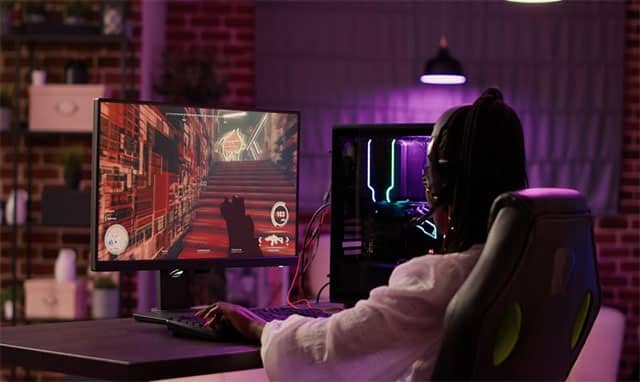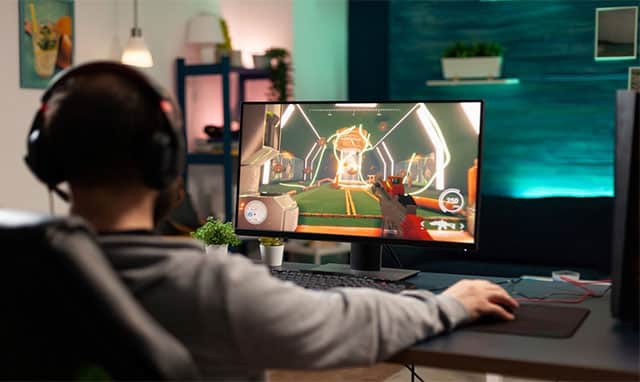4K Monitor for PC Gaming: Is It Worth It?
The electronics market has seen 4K Ultra HD explode in popularity over the past several years. It’s hit the gaming sector, too, with both the Xbox Series X and the PS5 offering support for native 4K gaming. So, if you’re a PC gamer seeking graphical bliss on your favorite titles, it might seem like the perfect time to upgrade to a 4K UHD monitor.
There’s no doubt that a 4K monitor can give your PC gaming experience a major upgrade! However, not every PC gamer’s setup is ready to handle 4K, nor does every gamer need it just yet. So how can you tell if 4K is for you? Our guide is here to help you decide.

What Is 4K?
4K is a graphics display resolution that represents the next big leap in digital graphics. The name “4K” (also called Ultra HD or UHD) refers to the fact that each rendered frame is approximately 4,000 pixels wide, or 3,840 wide x 2,160 tall to be exact. That’s approximately four times the number of pixels in a standard 1080p Full HD display.
As you might expect from that description, 4K gaming looks just plain awesome when your rig can support it. Textures are significantly more detailed, and character and environment models are often much cleaner and sharper. Most TVs today support 4K resolution, but 4K gaming monitors have only recently become widespread.
For console gamers, there’s little downside to taking the plunge on a 4K TV or a monitor. Many current PS5 and Xbox Series X titles include the option to run in 4K with a locked 30 or 60 frames per second so you won’t have to worry about the potential hardware compatibility questions of 4K PC gaming. PC gamers, on the other hand, have a little more thinking to do because of the next factors we’ll talk about.
Also, read How to Boost Your Internet for the Best Gaming Experience.
Is a 4K Monitor Worth It for Gaming? Three Questions to Ask
-
Can Your PC Run Games in 4K?
Be sure to check your graphics card’s specs and benchmarks for 4K performance. Right now, only the fastest and beefiest graphics cards are built to handle 4K at higher settings. Some other high-end models can run it well as long as you’ve turned down certain settings, but many budget and mid-tier cards can’t really do it at all.
Don’t ignore your CPU and RAM either. While they’re not as key as the GPU, you want to make sure they’re not bottlenecking your expensive 4K setup. Finally, remember that the games you play also matter. Not all current PC games run in native 4K, and although upscaling technologies can help with this, it still won’t look as good as native resolution. This is even more true if you play a lot of older games, especially ones developed before 4K became widespread.
-
Are You OK with a Potentially Lower Frame Rate?
Even with a high-end graphics card, it’s tough to get more than 60 frames per second in a PC game running in 4K without turning some settings down. For anyone who plays mostly single-player titles or multiplayer games that don’t require lightning-fast inputs, 60 fps is perfectly good. However, if you play games that need higher frame rates (notably shooters and fighting games), you may be better off gaming in 1080p or 1440p for now.
Read to know How Much Storage for Gaming PC Wants?
-
Do You Mind Paying More?
Although 4K monitors are much more affordable than they were when the technology debuted, 4K support still comes at a price premium. A monitor that’s fully loaded with gaming features (such as adaptive sync and fast input times) and supports 4K will run you significantly more than a comparable non-gaming 4K monitor. Prices on 4K gaming monitors will continue to fall as the market matures, so it might be worth waiting if you’re on the fence (and on a budget).

What to Look for in a 4K Gaming Monitor
There’s a lot more to choosing a great 4K gaming display than just supporting 4K resolution. Some of the other features to look for include:
- Input Lag: Gamers need a monitor that processes inputs quickly. The current gold standard for competitive gaming is a 1ms input lag, with more wiggle room for non-competitive and single-player gamers.
- Panel Type: Both IPS and VA panels are popular with different subsets of the gaming community, so do a little research and decide which suits your needs better.
- Adaptive Sync: Make sure your monitor is compatible with the adaptive sync technologies of your graphics card (G-Sync for NVIDIA-based cards and FreeSync for AMD-based).
- High Dynamic Range (HDR): This cutting-edge technology provides the best color fidelity on the market today, and many gamers look for it when shopping for a gaming monitor.
- Size: 4K is most rewarding at larger screen sizes. You won’t find many 4K monitors less than 27 inches, but in general, you’ll notice a bigger visual difference with larger screens.
Alternatives to a 4K Gaming Monitor
If you’ve decided to wait on a 4K gaming monitor until the technology is more mature, you’ve still got some good choices for upgrading your monitor. One option is to go with the next highest common resolution: a 1440p gaming monitor. 1440p will still be a noticeable upgrade for any gamer who’s used to 1080p, but it’s much more widely supported and less expensive than 4K. It also gives you a little bit of future-proofing as 1440p increasingly becomes the standard of PC graphics.

The other possibility is simply to get a 4K TV and use it as a PC gaming display. This can be a cost-effective option, but there are a couple of caveats. First, you’ll want to be careful to avoid burn-in from static images like a PC desktop. Second, check the TV’s input lag, as most aren’t designed for the same responsiveness as gaming monitors. (If the TV has a “game mode,” that can help.) Finally, remember that TVs are designed for a longer viewing distance than monitors, so consider that you might have to introduce some tweaks to your setup, such as using a gamepad instead of a mouse and keyboard.
More:


